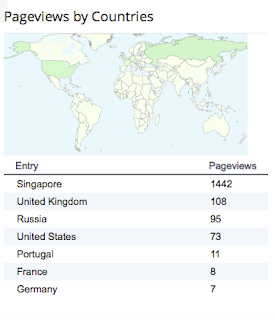 |
| Credit: Apple, iMac via Apple.com |
Credit: (Myself) Ryan Chew, Ryan's Portfolio Via YouTube
Prior to this module, I wasn’t a big fan of blogging because I thought of it as a chore. However, I have now developed a wholly different perspective. Blogging is a great way to help marketers like me to brand and promote myself. Also, the world has been revolutionized ever since the internet became more accessible and wide reaching. Blogs are vital tools simply to help people stay connected with one another by sharing stories, ideas, and information online.
 |
| Credit: Neighborhood Loans, Social Media Guide For Realtors via neighborhoodloans.com |
After all, like what I mentioned in Topic 1, I aspire to become a digital resident in all social, academic, and professional contexts. It would be prudent to construct a single online professional brand identity. Most importantly, by witnessing at the amount of page views I have obtained throughout the module, I know people are reading my blog on a daily basis. This has made me realise how much more cautious I should be about the digital footprints I am leaving behind online.
Total amount of Page views over the course of this module. Image by Ryan Chew via http://talktoryanchew@blogspot.com |
Lastly, it’s all about striking a balance in using the digital tools effectively and the responsibility to update my online profiles frequently. Striking a balance means to separate one’s private life from their professional one. This is important because prospective employers can potentially find your online profile and will look for professionalism. On a related note, updating profiles frequently is beneficial because you never know when prospective employers will view them. An updated profile will also seem more professional.
You can access most of my social media profiles by clicking on the widgets which are located at the side of my blog, or by clicking on the respective profiles shown below:

Once again, let me take this opportunity to thank Dr Lisa, Sarah, and Nicholas for this wonderful experience. I really enjoyed this module, and it certainly enhanced my knowledge in light of digital literacy. Lastly, I will look forward to seeing you in January.
[400 Words, excluding references]
References
iMac image (2015) Apple.com [Accessed November 16, 2015]
Neighborhoodloans. Social Media Guide For Realtors (2015) Neighborhoodloans, Your Neighborhood Lender
Final Portfolio Video (2015) PowToon.com [Accessed November 19, 2015]
Ryan Chew, Ryan's Portfolio (2015) YouTube Video [Accessed November 20, 2015]
About.me TalkToRyanChew profile (2015) about.me [Accessed November 16, 2015]
Twitter TalkToRyanChew profile (2015) Twitter.com [Accessed November 16, 2015]
Facebook RyanChewable profile (2015) Facebook.com [Accessed November 18, 2015]
LinkedIn TalkToRyanChew profile (2015) LinkedIn.com [Accessed November 18, 2015]
Instagram TalkToRyanChew profile (2015) Instagram [Accessed November 17, 2015]
Pinterest TalkToRyanChew profile (2015) Pinterest [Accessed November 17, 2015]
















